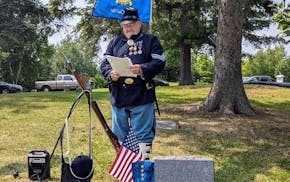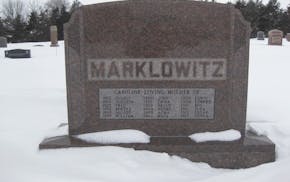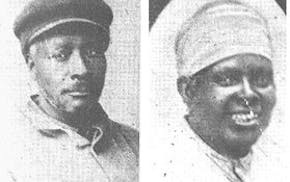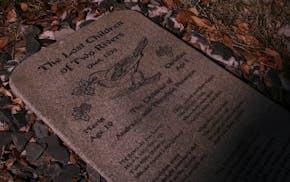Thomas Barnes worked as a lumber camp cook in northern Minnesota in 1867-68, seasoning beans with salt pork and burying a covered kettle beneath hot coals overnight. He'd use reflectors around an open fire to cook pies, biscuits, cookies, even apple jelly tarts.
"The timber men all respected me for my devotion," Barnes wrote in his memoir shortly before his death 100 years ago. "In the morning, breakfast ready; coffee boiling, beanhole uncovered, biscuits browning."
At night, after the lumberjacks were done playing games and had gone to bed, Barnes would read a Bible chapter and bow in prayer. If only they'd asked him about his life.
Born in England in 1842, Barnes immigrated with his family to Brooklyn when he was 10 and later moved to Indiana. Railroad work brought him to Iowa and then Minnesota, where his father owned farmland near Cannon Falls.
Barnes was harvesting grain with his brother when a man on horseback told them "the Civil War was on." Enlisting as a private at Fort Snelling at 20, Barnes joined Company C of the Sixth Minnesota Infantry only days before the U.S.-Dakota War erupted in the southwestern part of the state.
He was part of a burial detail camping near Birch Coulee on Sept. 2, 1862, when Dakota fighters surprised the soldiers at dawn, killing 13 and almost all the camp's horses. It was considered the Dakotas' most successful engagement before U.S. reinforcements turned the tide in the bloody six-week war.
"We were all green boys. I hadn't been a soldier ten days; just off the farm," Barnes wrote, recalling the tangle of dead horses and soldiers: "Bodies bloated with the hot sun."
Barnes was 74 when he wrote his aptly titled 38-page memoir, "Recollections of an Eventful Life." But his life nearly ended before he turned 21, when a Dakota bullet at Birch Coulee struck him in the chest and "spun me around like a top."
He discovered blood oozing near his ribs, but the brass eagle ornament on the strap of his cartridge box had absorbed the brunt of the shot. "It was providential. God be praised," he wrote. Col. William Crooks later saluted Barnes and called the close call "a feather in your cap, young man."
Barnes' memoir chronicles the war's final battle at Wood Lake and the Sixth Minnesota's ensuing engagements in the South at the end of the Civil War, fighting malaria in the swamps of Arkansas and Confederates on the coast of Alabama.
I stumbled on Barnes' recollections on Facebook, where a photo of 21 Sixth Minnesota soldiers — lounging amid drums and swords — popped up on a group chat called Minnesota History Research Conversations. The post came from Bruce Palmer, 79, a retired biology teacher in suburban Chicago who is Barnes' great-grandson and the author of "I Will Die With You," a 2019 novel about the U.S.-Dakota War.
Palmer and his late wife, Karen, drove to Minnesota in 2000 to join a Minnesota Historical Society tour of 1862 battle sites to see where his great-grandfather served. His website — iwilldiewithyou.com — includes a copy of Barnes' autobiography.
Barnes' memoir gives an eyewitness account of the tumultuous 1860s. He strings together a series of near-fatal mishaps with an engaging style, despite only a few years of elementary school in England and six months of "winter school" in Minnesota, "the extent of my 'larning,'" as he put it.
He admits he initially was OK with slavery because it was in the Bible, but says he later "got my eyes open" as a Union soldier and cast his first vote to re-elect President Abraham Lincoln.
Barnes' first wife, Nellie Smith of Glencoe, Minn., died from childbirth complications; two of their children died as infants and another son died at 17. His father slipped after jumping off a train and was killed in the fall of 1865, scuttling any chance to see him after the war.
"I certainly drank the cup of sorrow," he wrote.
In 1873, Barnes married Lida Butts, producing three more children, including Palmer's grandmother. In his remaining years he worked as a stone mason, cement contractor, sewing machine salesman and editor of the Logansport (Ind.) Times, living mostly in Indiana with forays into Tennessee and Texas.
Barnes died at 79 at his daughter's home in Chicago in 1922 and was buried at Mount Hope Cemetery beside Nellie and Lida in Logansport, where he was called a "prominent contractor and builder of this city." There's no mention in the obituary of his days with the Minnesota Sixth — a story that might have been lost had not his great-grandson inherited his memoir and put it online.
"When he arrived at Fort Snelling to join the Army, it wasn't even really an army," Palmer said. "They were just a bunch of guys off the farm — like my great-grandfather."
Curt Brown's tales about Minnesota's history appear each Sunday. Readers can send him ideas and suggestions at mnhistory@startribune.com. His latest book looks at 1918 Minnesota, when flu, war and fires converged: strib.mn/MN1918.

Civil War group honors the last Union veteran buried in each Minnesota county

St. Cloud professor's book paints nuanced look at enslaved woman freed in Minneapolis

Paying overdue tribute to his grandmother, a Minnesota farmer recarves family history

Civil War officer brought formerly enslaved family to Minnesota


